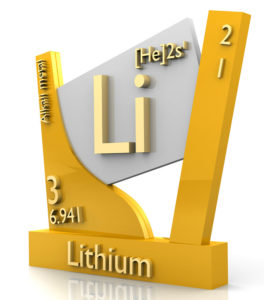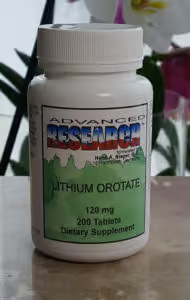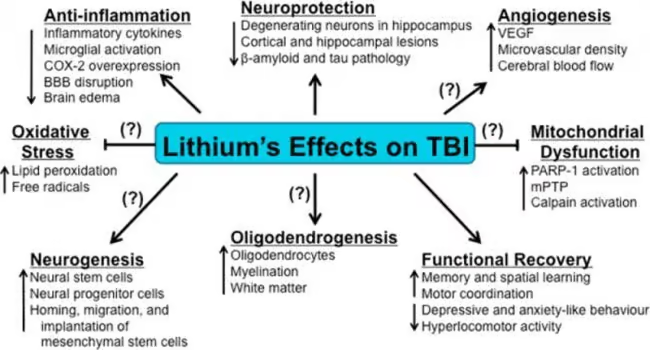Table of Contents
Key Takeaways
- Lithium is a natural alkali metal essential for reproductive health and overall wellness in humans and animals.
- Historically used for therapeutic purposes, lithium is studied for its neuroprotective and mood-stabilizing effects.
- Micro-dosing lithium through supplements like Lithium Orotate offers cognitive benefits such as mood balancing, promoting growth factors and neurogenesis, and brain protection.
- Adequate lithium intake from diet and water may help prevent mental and neurological diseases, while low levels can be associated with depression, anxiety, and memory decline.
- Lithium Orotate is a popular micro-dosing option that provides mood stabilization, neuroprotection, and cognitive enhancement without toxic side effects of higher doses.
Lithium is a soft, silvery-white alkali metal so reactive (it sparks when it touches water) that it’s not found in nature on its own. Instead, it’s found in mineral compounds and in mineral water.
Cosmologists believe that lithium was one of the 3 elements synthesized in the Big Bang.[i] So it’s been around for a long time.
Most of us associate prescription lithium with treating mental illnesses like bipolar disorder and mania (lithium carbonate). Or the lithium-ion battery in our phone. Which has a tendency to blow up occasionally.
Turns out that the anti-psychotic medication lithium isn’t even a drug. It’s actually a naturally occurring mineral. Lithium salts are part of the same family of minerals that include potassium and sodium.
As a nootropic, micro-dosing lithium provides some amazing anti-aging benefits. Recent research shows that low-dose lithium may also help slow the progression of neurodegenerative diseases like Alzheimer’s, dementia and Parkinson’s disease.
Low-dose lithium also helps neurogenesis and memory. And is a mood stabilizer.
Here we’ll investigate daily or frequent use of Lithium Orotate as a nootropic, and how it benefits cognitive health.
Lithium helps:
- Balance mood. Lithium calms mania (extreme highs and lows) by decreasing sensitivity of the post-synaptic norepinephrine receptor.[ii] And increases uptake of norepinephrine into synaptosomes. Preventing the release of this neurotransmitter. And lithium enhances the transport of Vitamin B12 and folate into brain cells.[iii] Affecting mood and aggression.
- Growth Factors. Lithium upregulates brain-derived neurotrophic factor (BDNF), nerve growth factor (NGF), neurotrophin-3 (NT3) and their receptors. And lithium stimulates the proliferation of stem cells in the brain. All boosting neurogenesis and assisting in repair from all types of brain injury.[iv]
- Neuroprotection. Lithium increases brain gray matter, increases DNA replication for neurogenesis, prevents apoptosis, increases N-acetyl-aspartate (NAA), inhibits beta-amyloid secretion and protects against damage once it’s formed, chelates aluminum, and protects against glutamate toxicity.
Overview
Lithium is an alkali mineral and one the trace elements considered essential for both animal and human reproductive health, and general health and wellness.
Discovered as a chemical element in 1817, lithium’s first recorded modern medical use was in 1871 for the treatment of mania.
But the use of lithium for therapeutic use goes back to ancient Greek and Roman times. People enjoyed soaking in alkali springs to help with physical and mental illness.
People have been using mineral springs for therapeutic use ever since. Lithia Springs in Douglas County, Georgia was so popular that people came for miles just to drink the water.
The Sweet Water hotel, a luxury 500-room resort was opened in 1887. And attracted famous authors, business people and prominent politicians who came for the spring’s health benefits. The name “Lithia” stems from water rich in lithium.
Studies from around the world have shown the critical health benefits of lithium. One study using data from 27 Texas counties from 1978 – 1987 found that rates of suicide, homicide and rape were significantly higher in counties whose drinking water contained little or no lithium.[v]
Another study of lithium levels in tap water in 18 municipalities in Japan showed standard mortality ratios lower in places with higher lithium levels.[vi]
Yet another study conducted in Texas in 2013 confirmed the original findings in that state. Drinking water samples from 226 counties found a correlation between lithium levels and suicide rates.[vii]
Researchers who conducted meta-analyses of lithium levels and public drinking water suggested “increasing lithium levels of drinking water could potentially reduce the risk of suicide, and justify administering lithium to tap water.”[viii]
An article in the Lancet in 1949 by John Cade is credited for the modern medical use of lithium as an effective treatment for manic psychosis.[ix]
The United States FDA approved high dose lithium carbonate and lithium citrate in 1970 for the treatment of bipolar disorder. Carbonic acid and citric acid are mineral carriers used to transport lithium throughout your body.
Doctors also prescribe lithium off-label for treating migraines, seizure disorders and psychosis usually after other treatments have failed.
But as we dig deeper into the most recently published research on lithium, we realize this trace element is essential for optimal health and brain function.
The lithium we get from our diet prevents many neurological and psychiatric problems. Micro-dosing lithium as a nootropic with a supplement like Lithium Orotate can help make up for the what we don’t get from our food and water.
Lithium is naturally available from fish, processed meat, milk, dairy products, eggs, potatoes and vegetables. Your typical dietary intake of lithium can range from 2 – 600 mcg. Amounts vary depending on where the food is grown.
How does Lithium work in the brain?
Lithium helps brain health and function in several ways. But two in particular stand out.
- Lithium stabilizes mood. Recent research has discovered that lithium’s mood stabilization effects may be due to its ability to boost the production of new brain cells (neurogenesis).
Lithium inhibits the enzyme glycogen synthase kinase-3β (GSK-3β). This inhibition upregulates brain-derived neurotrophic factor (BDNF), and insulin-like growth factor-1 (IGF-1) which stimulates neural stem cells to produce new neurons in the hippocampus.[x]
When neural stem cells produce new neurons in the hippocampus, mood and memory work as designed. But a breakdown in neurogenesis results in mood disorders.
Lithium has long been known to control mania and stabilize mood in bipolar patients. But it was not generally thought of as an antidepressant. Researchers in Tel Aviv provided the first evidence that inhibiting GSK-3β exerted a rapid antidepressant effect in mice.[xi]
Another team at Howard Hughes Medical Institute in Pennsylvania showed that feeding mice chow laced with low-dose lithium for 15 days produced a dose-dependent antidepressant effect.[xii]
Lithium induced gene transcription in the hippocampus, amygdala and hypothalamus. All areas implicated in depression, anxiety, bipolar disorder, autism and schizophrenia.
- Lithium protects your brain. Your brain cells are at constant risk of damage from exposure to toxins you encounter every day from food, air, water and your environment. And the excitotoxins produced by ordinary brain cell metabolism.
Glutamate plays a major role in the synaptic plasticity needed for learning and memory.[xiii] But over-activity of glutamate on its NMDA receptors causes neuron death and is implicated in Alzheimer’s, Huntington’s and Parkinson’s disease. Lithium inhibits this overactivity.[xiv]
Lithium also increases the production of a neuroprotective protein called bcl-2.[xv] Researchers maintain that lithium is the only “medication” that has been demonstrated to significantly increase bcl-2 in several brain areas.
Lithium has also recently been evaluated in preventing and treating traumatic brain injury. In a study conducted in 2014, Dr. Peter Leeds stated that lithium had “demonstrated robust beneficial effects in experimental models of Traumatic Brain Injury (TBI). These include decreases in TBI-induced brain lesion, suppression of neuroinflammation, protection against blood-brain barrier disruption, normalization of behavioral deficits, and improvement of learning and memory, among others.”[xvi]
How things go bad
In 1985, the United States EPA estimated that dietary intake of lithium from food in the USA varied from 0.6 to 3.1 mg per day.[xvii] For comparison, people who live in the Andes in Northern Argentina consume 2 to 30 mg per day, with 2 – 3 mg just from drinking water.[xviii]
As your dietary sodium and caffeine increases, so does lithium excretion in urine which increases your requirement for this essential trace mineral.
Your exposure to stress and toxins from things like mercury, aspartame, MSG, Bisphenol A (BPA) and other excitotoxins also raise cortisol and other stress hormones. Increasing your need for more water-soluble nutrients like B-vitamins, magnesium, zinc and lithium.
Low lithium levels are associated with …
↑ Depression and anxiety increase
↓ Memory and learning ability decline
↑ Insomnia increases
↑ Sensitivity to stress and chronic pain increase
↓ Natural healing processes decline
Adequate daily intake of lithium could help prevent many mental and neurological diseases due to this trace minerals effects on nervous system metabolism. And it’s anti-inflammatory and antioxidant effects.
Lithium Orotate benefits
The clinical research and studies on the neuroprotective benefits of lithium are so overwhelming, some scientists are beginning to ask “why isn’t everyone using lithium”?
Here’s a summary of how micro-dosing lithium using Lithium Orotate can benefit your brain.
- Inhibits apoptosis – lithium inhibits GSK-3 which has been linked to apoptotic cell death
- NMDA-receptors – lithium reduces glutamate induced toxicity mediated by NMDA-receptors which helps in mood disorders, Alzheimer’s, and other autoimmune and inflammatory diseases
- Neuroprotection – blocks the development of beta-amyloid tangles and plaque
- Neurogenesis – lithium promotes the increase of brain-derived neurotrophic factor (BDNF) needed for synaptic plasticity in learning and memory. Lithium also boosts nerve growth factor and glial-derived neurotrophic factor affecting learning, memory, mood and overall brain health[xix]
- Neuronal stem cells – lithium stimulates the stem cells needed to produce new neurons (neurogenesis)
- Stabilizes mood – lithium is known for providing a calming effect in healthy people as well as those dealing with depression, bipolar disorder, and mania
- Suicide prevention – adequate levels of lithium has been shown to reduce suicide risk in multiple studies worldwide
- Depression – lithium helps with treatment-resistant depression. In fact, lithium has been shown to improve the effectiveness of antidepressant medications
- N-acetyl aspartate (NAA) – lithium increases NAA which has been associated with higher IQ scores[xx] (i.e. lithium will make you smarter!)
The benefits of supplementing with lithium go far beyond just optimizing cognitive health. Lithium also helps decrease insulin resistance, helps in treatment of alcoholism and other addictions, supports bone health, balances your circadian rhythm and more.
How does Lithium Orotate feel?
My personal experience with Lithium Orotate has made me a believer in micro-dosing lithium. I’m Adult ADD and deal with mood swings from time to time.
If I’m going around the bend because something upset me, I take 5 mg of Lithium Orotate. Within 15 minutes my mood stabilizes and I feel normal again. Consistent use puts me in a happy mood.
Many others report you’ll feel the results taking a low dose of lithium quickly. But for some, the full effect can take anywhere from 1 to 3 weeks. Micro-dosing 5 – 10 mg of lithium daily results in consistent results within a month or two for some. I’ve experienced great results within a couple of days.
So if you lash out at people in anger, and don’t fully understand why you get so angry – it could be your lithium levels are low.
Many neurohackers with depression and anger issues notice results quickly. Within the first couple of days you should feel more calm, relaxed, and experience less stress.
Keep in mind that lithium at any dose is not for everyone. But if you get adequate lithium from your diet and water, and still experience some of the mood swings talked about in this review, you could be dealing with other issues. You should know within a couple of hours of supplementing with low-dose lithium if this supplement is for you.
For some, Lithium Orotate means feeling excited about life for the first time in a long time. Anxiety and social anxiety are no longer a problem. Life is more fun and enjoyable.
Some say Lithium Orotate works better than any prescription that they’ve ever tried to treat severe depression. It provides a nice, smooth mood balance without all the toxicity associated with mega-doses of lithium carbonate.
If you’re dealing with PTSD or mild insomnia, you may want to try Lithium Orotate. Focus could improve, racing thoughts diminish and motivation levels could increase. You’ll have more coping ability.
Lithium Orotate Clinical Research
Lithium Improves Memory
A study at McMaster University in Canada set out to determine the effects on hippocampus volume in 14 bipolar patients who received lithium therapy.
The researchers examined the effects of lithium on hippocampal volumes and memory performance and recall over 2 – 4 years. The patients had not received any type of medication prior to using lithium.
The study found increases in hippocampus volume over time. And evidence of improvement of verbal memory performance over the 4-year measurement period.
The researchers concluded that the results of the study were consistent with the literature stating the neuroprotective effects of lithium. And that long-term lithium treatment is associated with preservation of memory and recall due to increased hippocampus size.[xxi]
Lithium Increases Mood in Recovering Addicts
24 adults recovering from heroin or methamphetamine addiction participated in a study in San Diego. Group A received 400 mcg per day of lithium taken orally for 4 weeks. The placebo Group B naturally took a non-active placebo.
Subjects completed a mood test questionnaire containing questions about their ability to think, work, mood and emotions. For the lithium group, mood test scores increased steadily and significantly during the 4 week period.
The lithium group also reported significantly increased levels of happiness, friendliness and energy. Group B showed no improvement during the same period.
The researchers concluded that low-dose lithium provided a mood-improving and stabilizing effect.[xxii]
Lithium Orotate in the Treatment of Alcoholism
In this study, 42 alcoholic patients were treated with Lithium Orotate during alcohol rehabilitation in a private clinical setting for six months. The data was collected from clinical practice records for the 10 years following the initial study.
The patients received 150 mg of Lithium Orotate daily for six months along with calcium orotate, magnesium orotate, bromelain and essential phospholipids.
Ten of the patients had no relapse from 3 – 10 years. 13 patients stayed sober from 1 – 3 years. The remaining patients relapsed between 6 – 12 months.
The researchers concluded that Lithium Orotate therapy was safe in treating addiction with minor adverse side effects.[xxiii]
Lithium Orotate Recommended Dosage
Lithium retains a grim and undeserved reputation. Likely because it was originally associated with serious mental illness. And like most medications, lithium can produce serious side effects if not monitored properly.
Lithium carbonate or lithium chloride salts are typically prescribed for long-term control and to treat bipolar disorder at 900 – 1200 mg per day. The major problem with such high doses of lithium are some very serious and debilitating side effects.
For nootropic use, I suggest Lithium Orotate which typically contains only 5 mg of elemental lithium. Lithium Orotate is orotic acid combined with lithium.
Orotic acid reportedly makes the lithium more bioavailable than lithium carbonate. The lithium is released once it crosses the blood-brain barrier. So you’ll get the benefits of lithium supplementation while avoiding the toxic side effects of high doses.[xxiv]
Lithium Orotate supplements recommended dose is 5 mg two or three times per day. See “Where to buy Lithium Orotate” for more on lithium amounts in nootropic supplements.
Many neurohackers use Lithium Orotate only as needed. For example, when feeling anxious or in the middle of a mood swing.
For someone with bipolar disorder or manic disorders, increasing to two 5 mg tablets up to 3-times per day may be more effective.
Naturopathic doctors suggest stacking 1,000 mg of Omega-3 and 400 UI of Vitamin E (as mixed tocopherols) each day you’re using Lithium Orotate.
Lithium Orotate Side Effects
Do not confuse Lithium Orotate with lithium carbonate. The carbonate version of lithium is only available by prescription and comes with a host of side effects.
Prescription lithium used in excess has been shown to have adverse effects on thyroid and kidney function. This is NOT a problem when supplementing with Lithium Orotate when used at recommended dosages.
Lithium Orotate at low doses is non-toxic and lab tests are not required to monitor your lithium levels because it does not show up in blood samples.
Lithium Orotate should not be used if you are dealing with significant renal or cardiovascular disease, severe dehydration or sodium depletion, or if you’re taking diuretics or ACE inhibitors.
Do not use Lithium Orotate if you are pregnant or breast-feeding.
You should check with your doctor if you are on any medication before using Lithium Orotate.
Where to Buy Lithium Orotate
Mother Nature has already put the antipsychotic “drug” lithium in drinking water. And you get some lithium from food depending on where it’s grown.
Supplemental Lithium Orotate typically comes in 120 or 130 mg capsules or tablets containing 5 mg of elemental lithium.
I recommend and use Advanced Research Lithium Orotate which was formulated by Dr. Hans Nieper.
Nootropics Expert Recommendation
 Lithium Orotate 5 mg 2 or 3 times per day.
Lithium Orotate 5 mg 2 or 3 times per day.
I recommend using Lithium Orotate as a nootropic supplement if you’re feeling anxious or depressed. Or experiencing mood swings.
Your body does not make lithium on its own. So you must get this essential trace mineral from your diet, or a supplement like Lithium Orotate.
Lithium combined with orotic acid makes Lithium Orotate which readily crosses the blood-brain barrier, and you should feel its effects within 15 – 20 minutes of taking it.
Lithium Orotate is especially effective if you’re feeling stressed, or mentally overworked. Your brain uses lithium faster and it needs to be replaced. Which you can do by using Lithium Orotate.
Lithium Orotate is great if you are ADHD because lithium calms the hyperactivity in your brain.
Lithium supplements do not change your state of consciousness. It simply helps bring you back to feeling normal and happy.
I suggest trying Lithium Orotate as a nootropic supplement with your first dose at 5 mg and see how you react. If you experience no negative reaction, try another 5 mg in a few hours. Up to 3 – 5 mg doses per day.
You’ll likely experience the full benefits of Lithium Orotate within a week of consistent use.










Join The Discussion - 877 comments
Doyle Nutbush
February 15, 2018
Is there a protocol for coming off of a anti-depressant like Cymbalta(60mg in my case) and converting over to Lith Orotate ?? I’m also on a ACE inhibitor(Lisinopril). I read your link to drug interactions and the title to that page was for Lithium, not a listing for Lith Orotate, or are they the same interactions ??
Thanks in advance
David Tomen
February 15, 2018
Doyle, Lithium Orotate is ‘lithium’ albeit in a much smaller dose than the pharmaceutical. It will have the same interaction but degree will depend on 1) amount of lithium orotate and pharmaceutical and 2) your own body chemistry.
I’m not aware of any protocol for detoxing specifically from Cymbalta. But NADH has been used intravenously since the 1960’s for detoxing patients from alcohol, opiates, tranquilizers and stimulants (https://www.thefix.com/content/brain-restoration-'too-good-be-true'-addiction). If that link doesn’t work for you, see my review on NADH here: https://nootropicsexpert.com/nadh/ and scroll all the way down the bottom of the green Nootropics Expert Recommendation box for a link to the study.
Use the same site for drug interactions to check for Lisinopril interactions with any nootropic you are thinking of trying.
Alan
December 27, 2017
I have mild ADHD with anxiety. I have tried lithium orotate (5 mg elemental lithium) a few times and have noticed blurry vision. Is this one of the side effects of lithium and if so with continued use should this side effect go away?
David Tomen
December 27, 2017
Alan, it is possible that lithium orotate affected your vision. It is one of the very rare side effects reported. And it is possible that the symptom will go away over time. But it is also possible that lithium orotate may not be a good option for you.
Please do a search of Nootropics Expert for “anxiety” and find some other options. You have plenty to choose from and to experiment with. Thank you for your question.
David Clark
July 24, 2018
Is the blurry vision a side effect from the lithium, or the orotate? Life Enhancement carrys a Lithium supplement from Pearson and Shaw that contains a lithium sulphate form.
David Tomen
July 25, 2018
David, I haven’t heard of Lithium Orotate causing ‘blurry vision’. So not sure what could be causing that symptoms. Other than possible interactions with other prescription medications.
Patricia volkova
September 23, 2018
Hi David, I am on Lithium-Carbonate (and come from Quetiapine) and also got that blurry vision. When I started the Performance Lab Multi, the blurry vision went away soon.
Allison
December 9, 2017
After reading your article i decided to get some lithium ortate for my daughter who is going through a very bad post partum psychosis an is on haldol tried to get her off haldol but her symptoms get worse whdn she does not take it. She also has bipolar .where can i get it ,please i need help.
David Tomen
December 9, 2017
Allison, Lithium Orotate could be a great option for your daughter. But please use caution because studies have shown big problems combining lithium with Haldol. https://www.ncbi.nlm.nih.gov/pubmed/6415823. Lithium Orotate is a fraction of the dose they’re talking about in these studies where they were using lithium carbonate. But one study mentioned problems even with low blood lithium levels. So if you are going to try Lithium Orotate please do not use it in combination with Haldol.
Nootropic supplements should be able to help your daughter. But it will take some research and experimenting. One of the better options that comes to mind is CBD Oil > https://nootropicsexpert.com/cbd-oil/. I would also check out zinc > https://nootropicsexpert.com/zinc/. And a high quality B-Vitamin complex.
I mention the B-vitamins because they are critical for optimal healthy brain function. Vitamin B9 – Folate for example is absolutely required for brain neuroplasticity. And the synthesis of ALL the major neurotransmitters > https://nootropicsexpert.com/vitamin-b9-folate/. But choose a complex that is highly bioavailable like Life Extension’s BioActive Complete B-Complex. You want to avoid any B-Complex that uses folic acid instead of folate. Or uses cyanocobalamin instead of methylcobalamin.
I suggest you do a search here on Nootropics Expert for “bipolar” and another search for “psychosis” and see what turns up. If you have any questions please leave it in the comments section of the related post.
Frank
December 5, 2017
I’ve had lifelong low level depression. I was actually on adderall for nearly a decade to combat depression/focus and it pretty much nearly destroyed me towards the end. After stopping adderall two years ago my motivation and love for life struggles but will never go back to it or any pharmaceutical anti-depressants again. The battle to get off adderall has been the hardest thing in my life.
I don’t know the lithium orotate dosage I should take given my situation. Really hoping I can feel happy again seems out of the 100 different supplements I’ve tried this one might work with so many success stories. I started on 10 mg a day then 20 mg not sure if I should go higher or give this dosage more time.
David Tomen
December 6, 2017
Frank, follow the dosage notes in this review for Lithium Orotate and you’ll be fine. But please consider repairing the receptor damage caused by Adderall. You could try something like Lion’s Mane Mushroom > https://nootropicsexpert.com/lions-mane/.
You can also help repair some of the damage and boost your mood using DHA > https://nootropicsexpert.com/dha/. Combined with PC > https://nootropicsexpert.com/phosphatidylcholine-pc/
That will get you started on the road to recovery. For more ideas on what you may do repair your brain, please see this post I wrote recently on treating Traumatic Brain Injury here > https://nootropicsexpert.com/best-nootropics-for-traumatic-brain-injury/
Frank
December 8, 2017
Thanks for the info one thing been suggested is taking Rhodiola Root Extract. It’s a little costly and I’m already spending a good amount on supplements just was curious if it may be worth trying. Side note noticing daily small improvements taking Lithium Orotate. I also do a keto diet and work out regularly this supplement definitely helps lift my mood. It’s a shame doctors prescribe horrible SSRI’s before suggesting this stuff.
David Tomen
December 8, 2017
Frank, Rhodiola is definitely worth trying. I use it every day and find it has a positive effect on my mood. But make sure you are careful about which Rhodiola you choose and get it from a highly reputable source. It is one of the supplements that has been flagged by the industry for often being adulterated because of limited raw supply.
Frank
February 9, 2018
What source do u suggest for Rhodiola Root Extract? Still
struggling taking so many nootropics daily but feel I may have damaged my self beyond repair. Still in hopes I’ll find one that really helps.
David Tomen
February 9, 2018
Frank, getting genuine Rhodiola Rosea is a tough one. The most reliable and trustworthy manufactures for this nootropic right now are Solgar (Standardized Full Potency Rhodiola Root Extract). And Gaia Herbs Rhodiola Rosea products.
I wrote a post late last year about recovering from traumatic brain injury which may help you here > https://nootropicsexpert.com/best-nootropics-for-traumatic-brain-injury/
Ginny
October 23, 2017
Is it possible that lithium orotate can raise blood pressure? I was using it and loving the way I felt but when I went into my dr. My blood pressure was unusually high. I quit using it and it seems normal again.
David Tomen
October 24, 2017
Ginny, Lithium Orotate often stabilizes blood pressure. I’ve found it lowered mine to safer levels and some other neurohackers have reported the same.
But it is possible for Lithium Orotate to interact with other medications. Which may raise blood pressure. Take a look at the other medications and supplements you are taking. Here is a partial list of drug interactions and lithium > https://www.rxlist.com/lithium-page3/supplements.htm#Interactions.
It’s also possible that your body has sufficient levels of lithium already. If that’s the case then using Lithium Orotate would send you over the safe limit for lithium.
Ginny
October 24, 2017
Thank you for your response! I’m not on any medications, but just take some supplements, such as CoQ10, MSM, codliver oil, B vitamins, Inositol, and B12, and “Natural Calm” a magnesium plus Calcium formula. I really was wanting this to work for me. I’m going through almost unbearable stress right now. Maybe the stress itself is pushing my blood pressure up, I don’t know. I normally have always had low to normal blood pressure.
David Tomen
October 24, 2017
Ginny, take a look at this article I wrote on dealing with stress here > https://nootropicsexpert.com/top-7-nootropic-adaptogens-to-conquer-anxiety-and-stress/.
You may want to consider Lemon Balm, Bacopa or Rhodiola. I’m reluctant to suggest a specific nootropic because your body may react differently to something that works for me. I have great success with Rhodiola Rosea. You may have more success with Lemon Balm. Keep on experimenting until you find your sweet spot. It sounds like you’re getting very close.
Ginny
October 27, 2017
Thanks David! Tried Rodiola Rosea. It actually made me more anxious, unfortunately. But am giving it to my husband who has mild cognitive impairment. I will check out lemon balm. I’m taking GABA and inositol at night and that is working well for me. Thanks for all your help!
Marie
September 1, 2017
Will Lithium have any effect on the growth of a lymphatic cancerous tumor?
Thank U,
Marie
David Tomen
September 1, 2017
Marie, answering your question is way above my pay grade. But from what I’ve been able to find in the research, “lithium was found to prevent metastasis to the lungs, liver, and lymph nodes by inhibiting TGFBIp-induced tumor lymphangiogenesis.” According to this study > https://www.nature.com/articles/srep20739.
Other research seems to support this but not specifically lymphatic tumors > https://bmcmedicine.biomedcentral.com/articles/10.1186/1741-7015-10-131. And here > http://journals.plos.org/plosone/article?id=10.1371/journal.pone.0134676. Toxicity of lithium is mentioned when talking about high dose lithium carbonate-type drugs used to treat bipolar disorder and the like > http://cen.acs.org/articles/91/i12/Limits-Lithium.html.
But here we’re talking about using micro-doses of lithium with Lithium Orotate. I strongly suggest discussing this further with your doctors.
Rose
December 9, 2018
I read that oratic acid in the oratate is carcinogenic and can cause cell mutations. It can also contribute to the growth of an existing tumor and is not advisable for a health conscious individual to consume.
I take Lithium oratate daily and I found this information to be very disturbing, as I am not ready to give up the benefits of this supplement.
David Tomen
December 10, 2018
Rose, would you please provide a link to a peer-reviewed clinical study that shows oratic acid is carcinogenic? Please don’t link to some other website. We need an authority here with definitive proof that this is true.
Scott Sessoms
November 4, 2023
I see this is an old thread… but what is latest on the Oratic Acid portion, I too have read carcinogen concerns but do not remember the source, though guessing decent amount of research/opinions/etc by this point. Is Orotate the best source for low dose lithium. I think (?) I may have heard of Lithium Aspartate as well. (FYI, feel there is a grammar type-o towards end of your info. Should say recommend 5mg. dose up to three times daily. I could be wrong. : )
David Tomen
November 8, 2023
Scott, I said “Lithium Orotate supplements recommended dose is 5 mg two or three times per day” and variations on that theme. The 5 mg dose is the elemental lithium and the rest of the capsule or tablet is orotic acid as a carrier. And the ‘official’ listing for orotic acid states “No indication of carcinogenicity to humans (not listed by IARC)” (https://pubchem.ncbi.nlm.nih.gov/compound/Orotic-acid).
cougar
August 19, 2017
Can I suggest 400-800 mg a day (2 divided doses) of magnesium citrate. If particularly anxious chew one till a powder and swallow with water. There are estimates that 80% of americans are magnesium deficient. Its being called an “epidemic” by some authorities. Magnesium keeps me calm. Lithium keeps me happy. Try it! It worked for me.
David Tomen
August 19, 2017
Good advice on magnesium. Only problem with Magnesium Citrate is it does not cross the blood-brain barrier very well. I use 200 mg of chelated magnesium about 90 minutes before bed and it helps me sleep. Another option that works even better is Magnesium-l-threonate which is a patented form of magnesium specifically designed to cross into the brain. More on that here > https://nootropicsexpert.com/magnesium/#dosage-notes
Robert
August 13, 2017
I tried 5mg of Lithium Orotate for a couple of days. I had great hope in my heart that it would help me with my anxiety, depression and insomnia. Instead I have noticed an increase in anxiety. I stopped taking all of my supplements today and tomorrow will try only the Lithium.
Has anyone else sensed an increase in symptoms? I so wanted this to work for me.
Bob
Håkon Martin NIlsen Bjerke
February 25, 2018
Lithium requires energy from the thyroid, if you’re unable to produce what is needed you might have more of an adverse effect i guess.
David Tomen
February 25, 2018
Håkon, thought I’d interject here because I am hypothyroid. And use Lithium Orotate without any problem. The studies done since the 1960’s indicate lithium therapy for bipolar patients can induce hypothyroidism in some patients. But the studies are talking about using therapeutic doses of prescription lithium such as lithium carbonate. We’re talking in the range of 500 – 800 mg of lithium per dose.
Lithium Orotate provides only 5 mg vs 800 mg. I highly doubt it will have any effect on the thyroid and it certainly hasn’t on mine.
One small correction on your statement… Lithium seems to accumulate 3 – 4X more in the thyroid than anywhere else in the body. And at high doses inhibits the release of thyroid hormones T4 and T3. Therein lies the problem in some people with a malfunctioning thyroid. (https://www.ncbi.nlm.nih.gov/pmc/articles/PMC1584230/).
If anyone seeing this thread has more information and cares to join in please do.
Nikki Alter
April 15, 2018
Hello,
I have Lyme etc etc and I am on tons ofherbs, supps, and vitamins, also starting chelating of metals per Andy Cutler . My question is – I already take remeron ( a tri- cyclic anti- depressant / anti- anxiety and Valium for sleep. I would love to transition to lith orotate 120 mg instead of that crap I’m on but am concerned if I overlap I will be getting too much serritonon etc ..
i also plan to try other things like typtophan, taurine, 5 htp, high does of melatonin , hydergine for depression , anxiety , sleep. The thing is I have been on the bad stuff for so long . Can you please advise
David Tomen
April 15, 2018
Nikki, I’m not a doctor and don’t even play one on TV. So please check with a doctor before trying any nootropic supplement with the medications you are using. Lithium Orotate provides a very low dose of elemental lithium. So shouldn’t interact with a tri-cyclic antidepressant, or with diazepam. But again, please check with your doctor.
But do NOT use any nootropic supplement that directly or indirectly affects serotonin while on these medications. Including tryptophan, 5-HTP and melatonin. Serotonin Syndrome is real and can be deadly.
David Tomen
April 16, 2018
Nikki, you deserve a more encouraging answer than I gave in my first comment. I stand by what I said about the interactions and dangers of combining prescription antidepressants and some nootropic supplements. But there are natural options to antidepressants that may help without the nasty side effects if used wisely.
Please see the post on nootropics for depression here > https://nootropicsexpert.com/best-nootropics-for-depression/
And another for sleep here > https://nootropicsexpert.com/best-nootropics-for-sleep/
Detoxing from these prescription meds can be tough. But it is worth the effort. Read through both posts. Each has links through to full reviews of each nootropic which include recommended dosage, side effects and types to buy. If you have questions about any of them please leave a comment below that review like you did here for Lithium Orotate.
The thing is there is no magic pill. You’ll not have success with just one supplement. It often takes a ‘stack’ of supplements to get to where you want to go. It’ll take time and experimenting but is worth the effort.
David Clark
July 24, 2018
Is the key word here “high doses” ? If someone is taking thyroid hormone and is hypothyroid (even mildly), should they not take low dose lithium orotate? Most people over 50 have some hypothyroidism going on, since any endocrine system slows down with age, but does the lithium make it worse, or antagonize thyroid output, etc.?
David Tomen
July 25, 2018
David, Lithium Orotate by its very nature is “low dose” because tablets usually have 5 mg of elemental lithium.
I am hypothyroid on high doses of natural desiccated thyroid (NP Thyroid). I use up to 5 tablets of Lithium Orotate per day for a total of 25 mg elemental lithium. And have not found it affects me negatively. I only get good results.